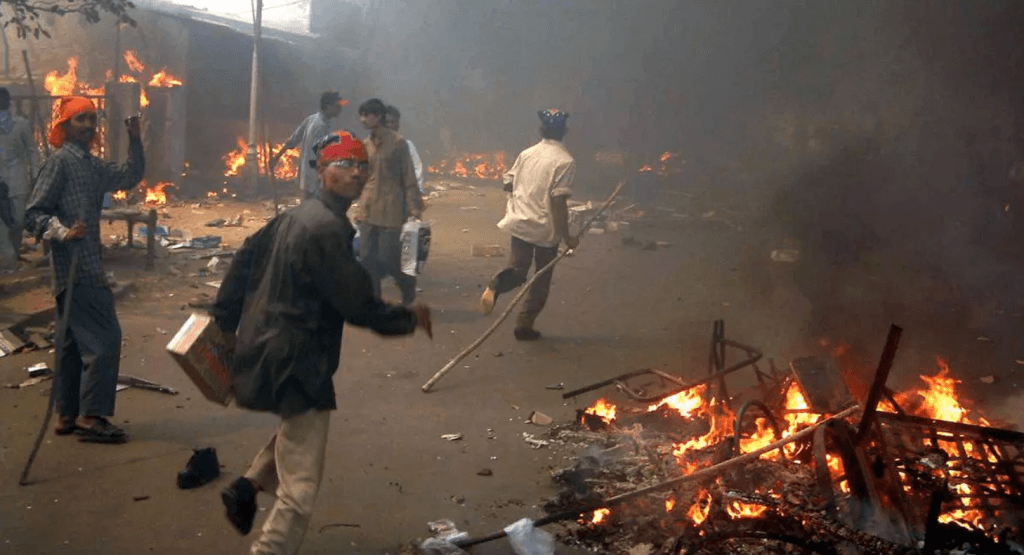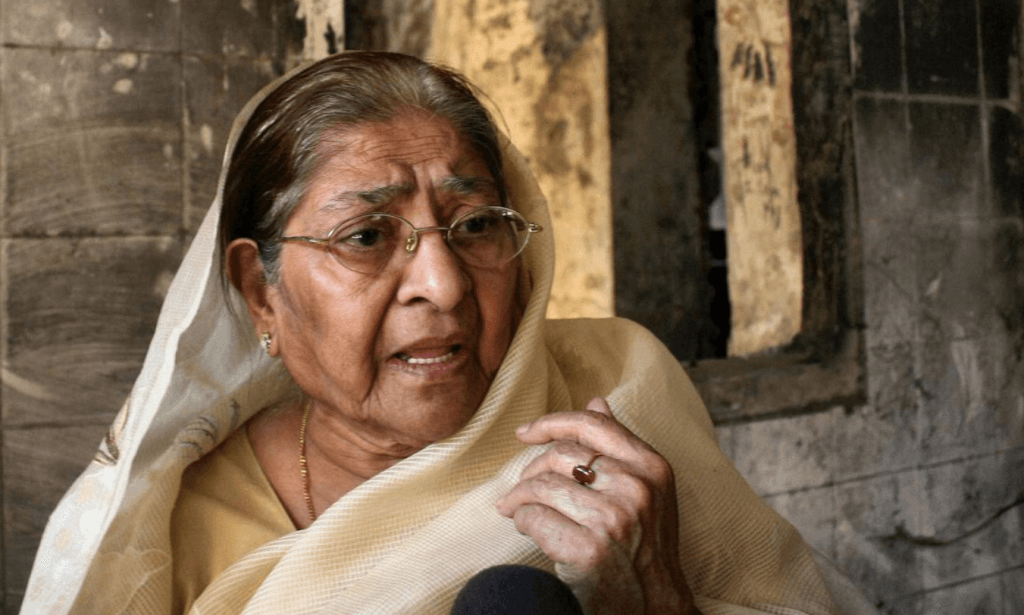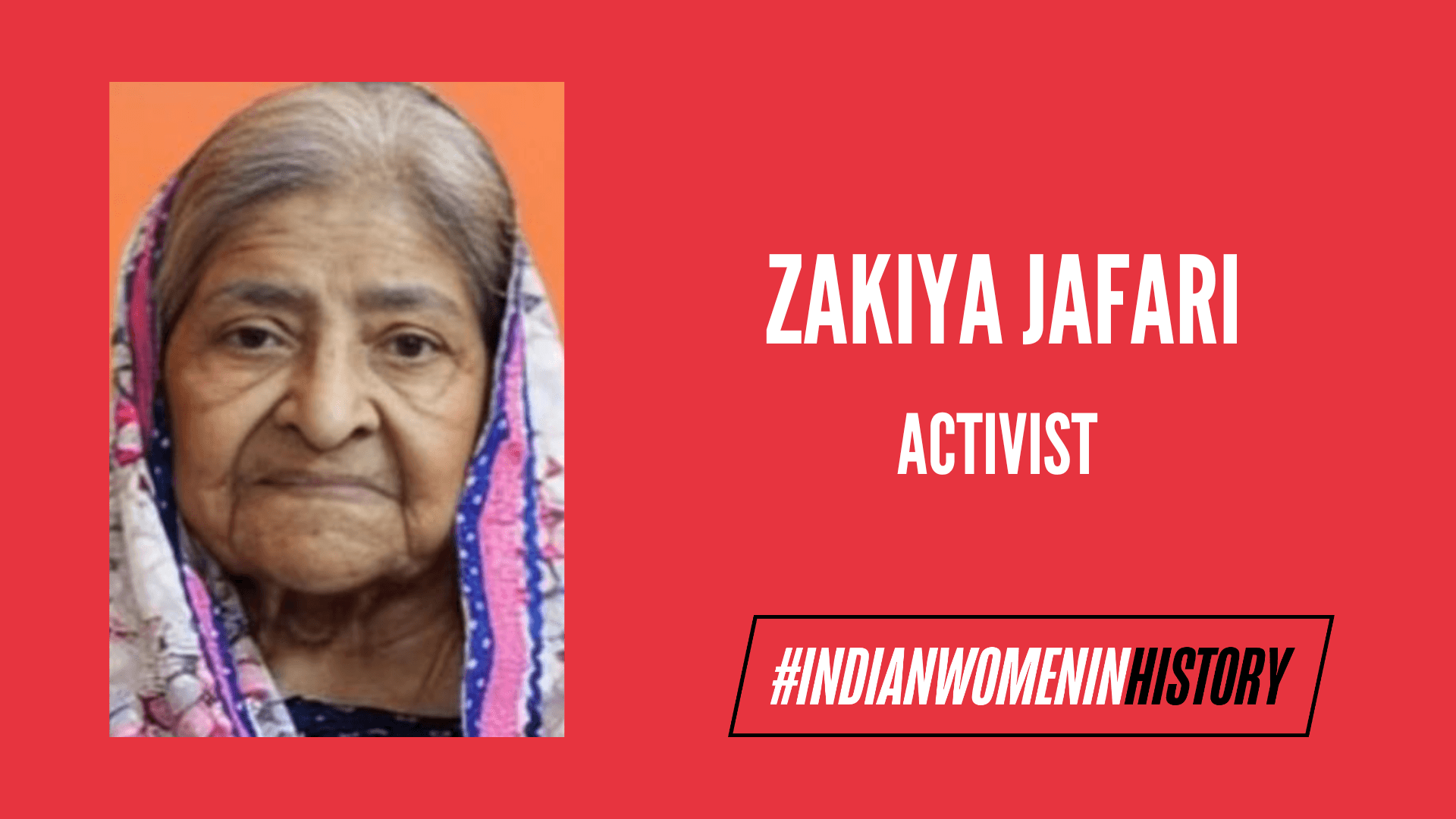Zakiya Jafri, a human rights defender and survivor of the Gulbarg Society massacre, part of the Gujarat Riots of 2002, passed away at the age of 86 on February 1. She belonged to Burhanpur in Madhya Pradesh and later, after marrying Ehsan Jafri, moved to Ahmedabad.
Zakiya is known for her pursuit of justice, which started after the Gujarat Riots in 2002.
The day that changed everything for Zakiya
On February 28, 2002, the day after the Godhra riots, Gulbarg Society was attacked by a Hindu mob. Zakiya, with her husband and Congress MP Ehsan Jafri, gave shelter to their Muslim neighbours to save them from the attacking mob. Ehsan stepped out of his home to appeal to the mob gathered outside, begging them to spare the lives of those hiding inside. But the mob ignored his pleas. And Ehsan Jafri, along with 69 others, was killed by the mob in the Gulbarg Society massacre. Despite numerous calls for help, neither the fire brigade nor the police reached the scene in time. The administration provided absolutely no response at the time; the police reached there only by 6 PM.

Zakiya mentioned that after the incident when she was brought to Shahibaug police lines, there were many policemen at their homes. When she asked them, “Why did you not come to my husband, my society, our neighbour’s rescue beta? We made so many calls.”
“We were given the day off,” one police officer replied.
This answer by the policeman raised serious questions about the role of administration and suggested intentional breakdown of state machinery.
Zakiya raised her voice against this injustice; she filed numerous cases in three different courts till 2022, when the Supreme Court dismissed her petition against SIT’s clean chit to current Prime Minister and the Chief Minister of Gujarat, Narendra Modi.
Zakiya’s activism
Zakia Jafri filed an FIR on June 8, 2006, against 63 people, including Narendra Modi, then CM of Gujarat; his associates; administrative positions holders (IAS, IPS, MLAs); and even some Union Ministry post holders under various acts and sections of IPC. This was the first case in the Zakiya Jafari Case. Zakia alleged that the police had not registered a case against powerful bureaucrats and politicians.

The Zakiya Jafari case was not just about the Gulbarg society massacre, but it included roughly 300 incidents across 19 districts comprising the horrifying acts of genocidal violence in Gujarat in 2002. This case aimed to establish both criminal and administrative responsibility and accountability of State missionaries in the riots of Gujarat.
This complaint addressed to PC Pandey, who was then DGP of Gujarat, says, “I beg to bring to your kind notice the deliberate and intentional failure of the State Government to protect the life and property of innocent denizens of this country through a well-executed and sinister criminal conspiracy amongst the accused above named that resulted in the breakdown of Constitutional Governance in the State. The civil service was paralysed, as was the police machinery, which was influenced, manipulated, and bullied into signing the murderous tune of the conspirators who were bent on destroying Constitutional Governance in the state, a style of governance that ensures core principles of equity, justice, and non-discrimination.”
This complaint filed on 8 June 2006, went unanswered by the authorities. This lack of response forced Zakiya to approach the Gujarat High Court and registered her complaint as a First Information Report (FIR) so that an investigation into a broader conspiracy behind the Gujarat riots could be initiated. The High Court, however, dismissed her request and directed her to lodge a private complaint. The process of private complaint is complex, that is why Zakiya Jafri appealed to the Supreme Court by filing a Special Leave Petition against the rule of November 2, 2007 of Gujarat High Court. The Supreme Court instructed the formation of a Special Investigation Team (SIT) to investigate Gujarat Riots and claims brought up in Zakiya’s petition.
The Supreme Court appointed noted legal expert Prashant Bhushan as amicus curiae to assist the investigation, but he was later replaced by Raju Ramchandran.
The SIT submitted its Preliminary Report on May 12, 2010, followed by a Closure Report on February 8, 2012. The report concerning the killing of Ehsan Jafri raised serious concerns. According to SIT data related to call records of Ehsan Jafri, it was unavailable; ironically, the report also blamed Jafri for inciting violence by discharging a firearm, invoking the notion of “action causing reaction” linked to the Chief Minister’s directives.
Moreover, during the process of submission of the Closure Report, the legal rights of Ms. Jafri were breached. As the report was submitted without providing the opportunity to speak, a right she legally holds. As a result, she had to file another Special Leave Petition in the Supreme Court, demanding access to all investigation records, reports, and documents. Despite the Court’s clear directive to the SIT to provide these materials, the team delayed compliance, with nearly a year elapsing between the submission of its final report on February 8, 2012, and the Court’s order on February 7, 2013, mandating the release of the documents.
These delays ultimately led Zakia Jafri, along with the Citizen for Justice and Peace, to file a Protest Petition on April 15, 2013. In this protest petition, Zakiya requested:
“That in deciding the protest petition, the Hon‘ble Court has to exercise its independent mind on the Final Report submitted by the Investigating Agency. The Court is not bound by the conclusions drawn by the Investigating Agency. The Court has to look at the material to satisfy itself whether prima facie it is a case for taking cognizance of the offence. The material has to be looked at, not from the angle that it is sufficient for conviction but that the material is sufficient for proceeding with the case. The Court cannot adjudicate on the material to find out whether an offence is made out or not, which is the domain when the trial starts and evidence is led by the parties.“
In February 2013, following a Supreme Court directive, CJP’s legal team analysed 23000 pages of documents, which built the foundation of the protest petition and identified shortcomings in the SIT’s investigation and alleged a broader conspiracy. But after 18 hearings, the petition was dismissed on December 26, 2013, when Magistrate Ganatra accepted the SIT’s report. In 2014 Zakiya moved to Gujarat High Court, but in 2017 the Gujarat High Court rejected the allegations of a larger conspiracy.
In 2018, Jafri submitted a Special Leave Petition to the Supreme Court, contesting the magistrate’s rejection of her protest Petition. Additionally, she challenged the Gujarat High Court’s 2017 ruling insofar as it upheld the magistrate’s examination of her petition on substantive grounds. Through this appeal, Jafri sought a further investigation into the 2002 conspiracy.
On June 24, 2022, Justices A.M. Khanwilkar, Dinesh Maheshwari, and C.T. Ravikumar delivered an anonymous judgement affirming the clean chit granted by the magistrate and the SIT to the accused. The bench dismissed Mrs. Jafri’s petition, concluding that it lacked merit.
Despite the relentless, tiring, and biased judicial process, Zakiya Jafari fought a long battle, not only for her husband but also for those thousands who were killed, tortured, and displaced in the 2002 riots. Therefore, Zakiya Jafari’s identity is not limited to just being Ehsan Jafri’s wife. Along with her, others associated with the Citizens for Justice and Peace (CJP), including Teesta Setalvad, have been targeted by the system, various police cases have been filed against them, and even Teesta was sent to jail for 70 days. They are paying for standing against injustice.
After Zakiya’s death, Teesta Setalvad posted on her X, “Zakia Appa, a compassionate leader of the human rights community, passed away just 30 minutes ago! Her visionary presence will be missed by d nation family friends & world!“
Her son, Tanveer, remembered her as, “She was content and at peace ki woh baithi nahin rahi, bees saal unhone jung ladi (she was content that she didn’t just sit back, she fought for 20 years).”
“Since the murder of her husband, as a victim-survivor, she has fought relentlessly for justice not merely for herself but all women and others who are victims of an unjust and violent system,” Father Cedric Prakash, civil rights activist, said.
Zakiya Jafari may not have received justice yet, but through her resilience, she has left behind a lasting legacy for all of us—a legacy of standing for the truth, refusing to surrender, and raising one’s voice against injustice. Generations to come will remember her for this relentless fight, and her courage will continue to inspire us.





